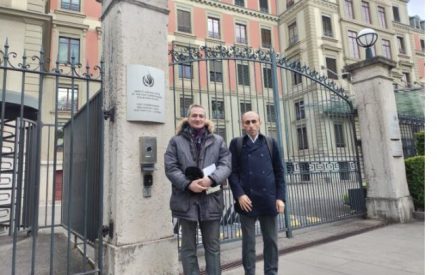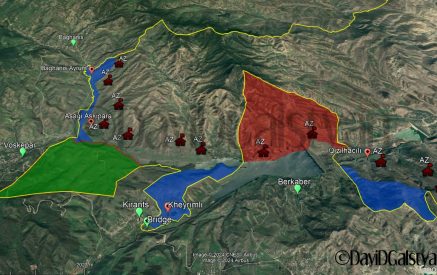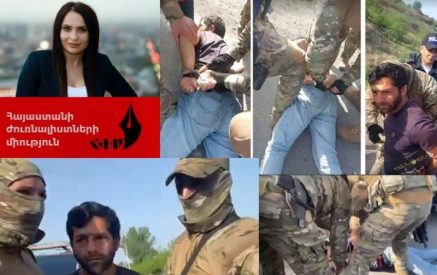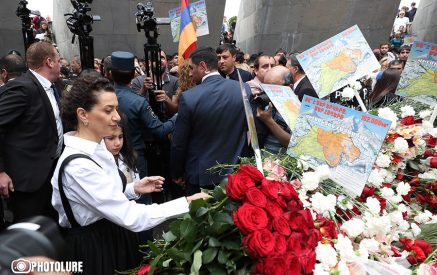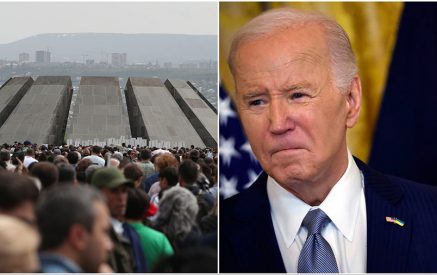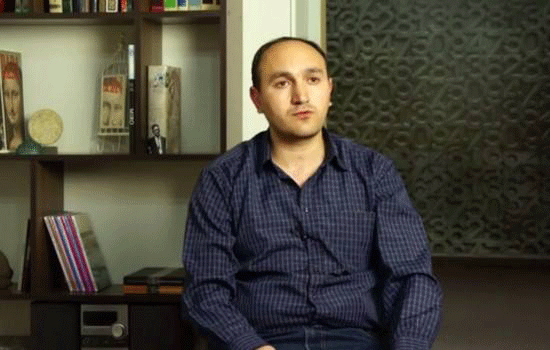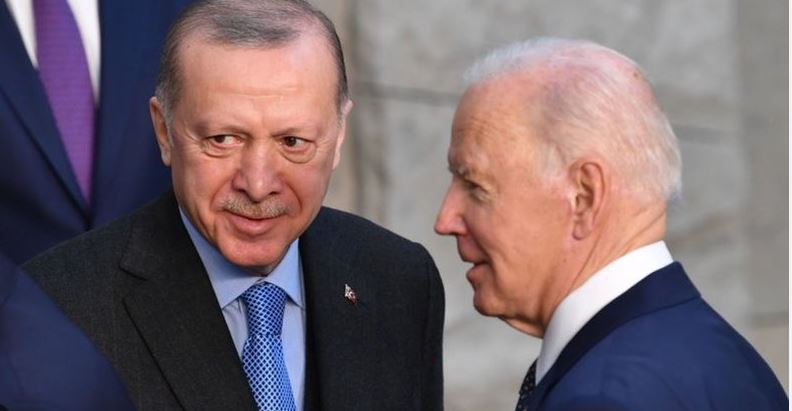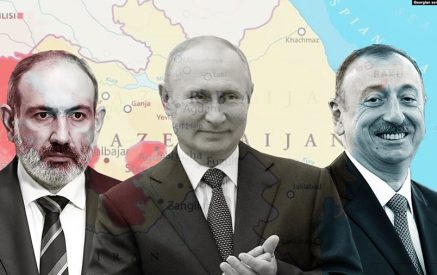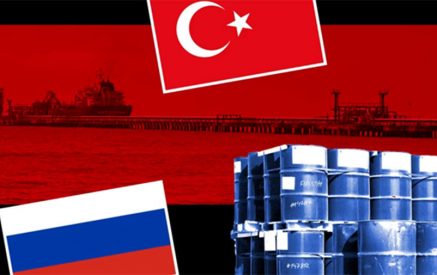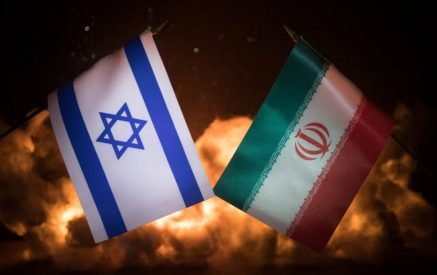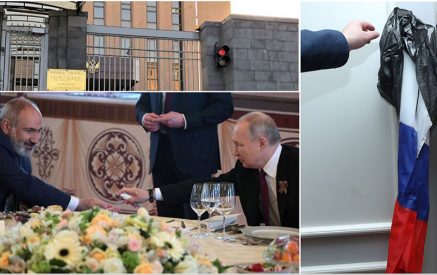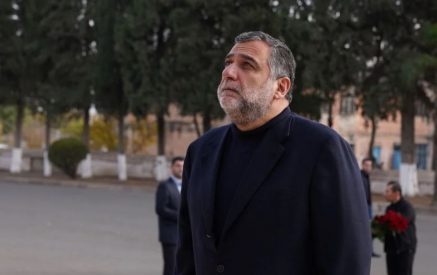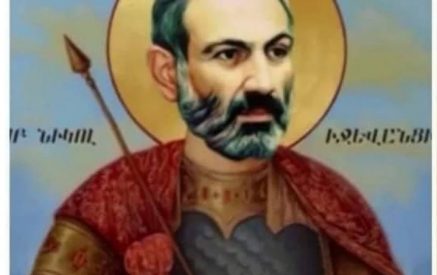Turkologist Hayk Gabrielyan analyzes why Turkey against the background of worsening relations with Russia did not initiate steps towards normalization of relations with Armenia.
– Turkish Hurriyet Daily News, which is one of the leading publications in the country, published an article where a question was raised why Turkey does not improve its relations with Armenia against the background of the crisis in Russian-Turkish relations. And indeed, in essence, Turkey has closed its border with Armenia by isolating Armenia from NATO too, in return “receiving” a Russian military, thereby not increasing its security. The author of the article admits that Moscow and Baku will definitely be against this move. What do you think, are there any prerequisites today to commence a new process of normalization of Armenian-Turkish interstate relations under new conditions, or nevertheless such rumors are just “touching” sentiments and nothing more?
– I think that there are a few key factors here why Turkey did not initiate moves to improve its relations with Armenia against the background of the worsening of relations with Russian. I have already mentioned that Turkey despite the deteriorated relations with Russia was reluctant towards the maintenance or deepening of this situation, on the contrary, it is interested in returning to the “old days”.
I consider the second and perhaps more serious factor to be the fact of Turkey’s not evoking Azerbaijan’s discontent and counteraction. In Zurich, after the signing of the Armenian-Turkish protocols, we saw how it was sharply perceived in Azerbaijan, which apparently Turkey did not predict too. Now, the situation is different. Turkey is well aware that the opening of the border with Armenia will evoke Azerbaijan’s deep counteraction, which reacted negatively even to the possibility of the opening of the Yerevan-Van flights, which eventually failed.
Read also
Turkey understands that the opening of the border with Armenia will economically contribute to the so-called Serhat (border) zone development, a significant growth of the living standards, where the 4 provinces included in the zone have quite weak development (Kars province ranks the 68 of 81 provinces in Turkey by the index of the socio-economic development, Igdir province ranks the 68th, Ardahan – the 71st and Ağrı – the 79th). However, this is not a weighty factor. The development of these settlements with dense Kurdish population is not a priority issue for the Turkish authorities.
On the other hand, Turkey is well aware of how Azerbaijan can be economically useful for Turkey for currently being its third major gas supply country after Russia and Iran. Turkey receives gas from Azerbaijan at the cheapest prices. We must not forget about the “TransAnatolian” gas pipeline (TANAP), which is under construction now, which will promote to the export of Azerbaijani gas to Europe, and which will promote to increase the volume of Azerbaijani gas to Turkey.
If in the future, the volume of gas supply to Turkey from Iran remains the same (according to the agreement of 25 years signed in 1996 between the two countries, Iran annually supplies 9.6 billion cubic meters of gas to Turkey), then a few years later, Azerbaijan will become Turkey’s second major gas supply country (by TANAP pipeline, Turkey will initially (Shah Deniz-2) receive another 6 billion cubic meters of gas from Azerbaijan, in addition to the current (Shah Deniz-1) to 6.6 billion cubic meters).
In addition, Azerbaijan’s energy carriers provide an opportunity to Turkey to turn into a major energy corridor, to significantly increase its weight and demand in the EU, US and the world in general, with all its consequences. In the future, the gas of Iran, Turkmenistan, Israel, Cyprus, Iraq, Egypt and Qatar can theoretically join the TANAP gas pipeline and exported to Europe.
In this case, Turkey will turn into the world’s largest gas center when the gas of a dozen countries would be exported to Europe thru its territory (also the Russian gas in the case of the construction of the “Turkish Stream”). The great part of Azerbaijani oil is exported to foreign markets thru the territory of Turkey (the “Baku-Tbilisi-Ceyhan” pipeline). The transport projects jointly with Azerbaijan are also important for Turkey, which specifically refers to the “Baku-Tbilisi-Kars” (BTK) railway.
I think that Turkey has intentionally delayed the construction of its BTK section, which in my opinion, is connected with the fact that Azerbaijan in its turn refuses or delays the lifting of visa regime (Azerbaijani authorities seeking not to allow the increase of Shi’ite Islamists’ influence attribute it to the fact that Iran demands that if Azerbaijan lifts the visa regime for Turkey, then it should do the same thing for Iran by intimidating that otherwise, it will cut off the land connection with Nakhichevan) operating unilaterally for Turkey (Turkey has lifted the visa regime for Azerbaijan several years ago), and the signing of the free trade agreement (Azerbaijan fears of the country’s “economic occupation” by Turkey, putting the monopolies of the government representatives under stake and of the fact that it would be more difficult to solve corruption problems with Turkish businessmen, allowing arbitrariness to them in comparison with the local entrepreneurs).
Despite all this, I think that Turkey’s stance on BTK will change soon, which is associated with the worsening of the Russian-Turkish relations (Turkish trucks have encountered difficulties when entering Russia thru Georgia), as well as with the factors of “truck wars” occasionally arising with Iran (accumulation of huge queues of Turkish huge-volume trucks on the Turkish-Iranian and Iranian-Turkmen border because of the problems with the transition by the territory of Iran and the fuel payments), which caused a great damage to Turkey’s economic expansion in the Central Asia.
Azerbaijan’s investments are also important for Turkey. Prior to the sharp fall of world oil price, it was reported that the Azerbaijani SOCAR is ready to invest 17 billion USD in Turkey and later increase this number to USD 50 billion, which will create thousands of jobs in Turkey.
Followed by all this, as well as given the known problems between Armenia and Turkey, at the moment, I do not see any prerequisites for the nearest normalization of the Armenia-Turkey relations. In any case, Turkey at least has the option to open the border with Armenia, which somehow may ease Azerbaijan’s seemingly inevitable anger. I am talking about the “small steps” tactics, which Azerbaijani famous journalist and political commentator Rauf Mirkadyrov has presented in his article published in the Azerbaijani “Zerkalo” paper in June 2011, citing his source of the Turkish Foreign Ministry.
He had stressed that everything will start not from exercising the known Zurich protocols (which envisage confirmation of diplomatic relations) but from such moves, which allegedly are dictated driven from the interests of ordinary citizens. I am talking about the opening of the Armenia-Turkey land border for ordinary citizens (in 1993, Turkey had unilaterally closed the air and land borders with Armenia, however, under the international community pressure, the airspace border was reopened in 1995) because, by and large, there are no special obstacles today for the mutual visits of citizens of Armenia and Turkey. It was emphasized that the opening of the land border, at first glance, will be geared towards reducing the expenses of ordinary citizens (bypassing Georgia’s territory), naturally, the individual trade will become active, including in the border area, which will ease the counteraction to Armenia by the population of Turkish bordering regions (Serhat zone) towards the normalization of bilateral relations.
The next major step should be the serious claim on the way to the establishment of diplomatic relations between Armenia and Turkey, although it should also be dictated by the “interests of solely ordinary people.” The point is that the citizens of Armenia and Turkey in both countries are deprived of all kinds of legal, including consular support and followed by this, it is necessary to open consular sections in Yerevan and Ankara adjacent to the embassy of any country (let’s say, the US) having tender relations with these two countries.
I think that the relations between Georgia and Russia in recent years can serve as a model for Armenia and Turkey. There are no diplomatic relations between Georgia and Russia too but it does not prevent them to establish direct trade-economic relations with each other, leaving setting up diplomatic relations and other quite complicated issues of the future.
– After the World War I Turkey has never been so actively involved in the political and military processes in the Middle East. And all this causes a lot of problems between Turkey and its Western allies. In your opinion, what is “taking” Turkey to this region? What does Turkey receive and lose? What is the outcome of all this, by and large?
– Turkish President Recep Tayyip Erdoğan is always known for his Islamist views, including during his tenure as a mayor of Istanbul, when he appears in jail for 4 months for pronunciation an Islamist quartet.
His ambitions to assume the leading role in the region and the Islamic (Sunni) world, drives and promotes demonstrating a great activeness in the Middle East by Turkey, the neo- Ottoman policy of Turkey that the great part of the Middle East was earlier a part of the Ottoman empire (years ago, Davutoglu had announced that Turkey has to deal with its neighbors as in the case of drawing a circle on the map by the diameter of 1000 kilometers around Turkey, it will include 20 countries, and in the case of drawing a circle of 3000 kilometers in diameter – 70 countries), Shia country Iran’s great activeness in the region and the necessity to counteract to it, the self-proclaimed role of a “defendant of the rights of Muslims” (although now, Turkey is accused of giving the “Incirlik”Air Base to the aviation of foreign countries, which taking the flights from there is attacking the Muslims in Syria), the deep disappointments on the accession to the EU, and why not, the “Arab Spring” with its ensuing developments. In particular, if Syria had not talked about the “Arab Spring”, I think that quite close ties between Erdoğan and Syrian President Bashar Assad that existed in the Arab country prior to popular unrest would be maintained.
I think that Turkey has largely failed in its Middle East policy, it has significantly increased the number of unfriendly countries against it, the demand for Turkey has significantly reduced in the Middle East, particularly in terms of mediation. For example, if earlier, Turkey could offer its mediation services to Israel and Syria, to Israel and Palestine, in recent years, it is deprived of this opportunity.
Over the time, it gradually became difficult for Turkey that has ambitions of a superpower in the region to maintain neutrality on various regional matters, and in this context, it had to express itself in this or that case. For example, in the case of Egypt, it seemed that Turkey was right to condemn the country’s longstanding president Hosni Mubarak’s actions against the protesters, who, to the point, was viewing Turkey as a regional competitor country, and when Islamist Mohammed Morsi came to power in Egypt, the relations between Turkey and Egypt became quite closer.
It seemed that Turkey won in this case, however, because of Morsi’s mistakes (Morsi did not choose Erdoğan’s adopted crawling Islamized policy by preferring the country’s obvious and rapid Islamization, and therefore, in some sense, with his Islamic views shared the fate of one of famous former prime ministers of Turkey, Necmettin Erbakan, whose coalition government had to resign under the pressure of militants in 1997), the militants overthrew him and the military coup organizer – Abdel Fattah al-Sisi – became the country’s president, Turkey strongly condemned all this, and now Turkey on behalf of Egypt has a country disposed unfriendly against it.
This means that there are cases when Turkey so to speak is not guilty of the failure. The geopolitical developments are following one after the other very quickly. On the other hand, to achieve success Turkey should be able to timely step back from it’s the so-called consistent policy and instead, pursue a flexible policy realizing that Morsi (“Muslim brothers) sentenced to life imprisonment, in the near future (or at all) will not be able to return to power in Egypt and Israel (by Turkey’s demand) will not lift the water blockage of Gaza section.
It turns out that by raising such claims, Turkey creates a stalemate and impasse situation for itself (Turkey is waiting 6 years for the fulfillment of its 3 conditions by Israel), and coming out of which becomes very obscure even in the case when now Turkey and Israel are eager to achieve normalization of relations (and especially reaching the Israeli gas to Turkey and then to Europe). In this regard, I would like also to mention the policy of “zero problems with neighbors” offered by Ahmet Davutoglu. There are many opinions in our country that Turkey’s “zero problems with neighbors” policy has failed, however, I do not agree with such allegations. Why? Because this policy should have first and foremost served and will still serve as an intermediate round, preceding the neo-Ottoman policy.
We must remember that thanks to the efforts of Foreign Minister Davutoğlu, Turkey significantly improved, the strained relations with neighboring countries were normalized, actions were taken even in the direction of Armenia, and it was no coincidence that in 2010, the American Foreign Policy prestigious magazine recognized Davutoglu one of the best diplomats of the year, a “New Kissinger”. To make this view more understandable, I would like to quote Davutoglu’s following words, “When we reach a zero problem policy with our neighbors, at that time, we will receive a wide field of maneuvering in the foreign policy.”
And this became a reality. Turkey thanks to the efforts of Davutoglu of greatly normalizing the relations with neighboring countries, first receive a wide field of maneuvering, and then, in the current decade, dramatically increased his foreign policy, thereby increasing the number of unfriendly countries against him (Turkey’s neighboring countries began to furthermore blame Turkey for its intervention in their domestic affairs). Now, I see that the time to change the foreign policy of Turkey and to return the “zero problem with neighbors” has come.
Turkish new Prime Minister Binali Yıldırım has already announced two times that they are going to try to reduce the number of hostile countries and to increase the number of friendly countries. Yıldırım even stressed that there are no eternal enemies, which is a telling message in itself. All this, as well as stretching an “olive branch” to Russia by Erdoğan (“correspondence diplomacy”), the attempts to normalize relations with Israel (also, with Egypt in some way), give me a ground to think that Turkey is at least temporarily returning to the “zero problems with neighbors” policy to regain a wide field of maneuvering or an alternative, and then to dramatically reactivate in the region (now, it is even not excluded that Erdoğan will mitigate his tough stance against Assad because of the Syrian Kurds. Erdoğan’s and Assad’s interests coincide on Syrian Kurds. They both do not want autonomy or establishment of an independent state by Syrian Kurds).
EMMA GABRIELYAN



